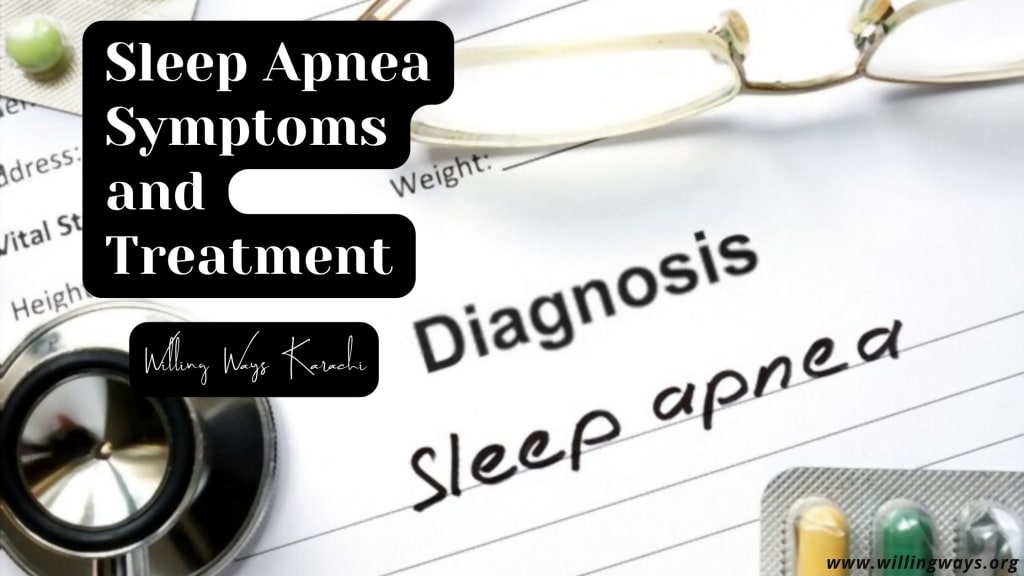Sleep Apnea Symptoms and Treatment
As a result, you are often unaware of this and will wake in the morning believing that you slept right through the night.
By Willing WaysPublished about a year ago • 3 min read
Like
Share

Best addiction treatment center in Karachi
The most commonly recognized symptoms of insomnia are:
- Loud snoring. Many cases of sleep apnea at the best addiction treatment center in Karachi are the result of a blockage of the airway caused, at least partly, by excessive tissue at the back of the throat. The Restless legs syndrome and its Symptoms are also discussed at the treatment center for the patient’s recovery. When your brain awakens you sufficiently to start breathing again, you take in a large breath initially, and this causes this excess tissue to vibrate, resulting in loud snoring.
- Excessive daytime tiredness. Because your brain wakes you constantly throughout the night to breathe, you are enjoying only exceptionally light, fragmented and poor quality sleep, leaving you still tired at the end of your night's sleep. It should be noted that although the brain wakes you many times during the night, it only raises your consciousness sufficiently for breathing. As a result, you are often unaware of this and will wake in the morning believing that you slept right through the night.
In addition to these primary symptoms, if left untreated, sleep apnea can lead to:
- Headaches (particularly in the morning).
- High blood pressure (and other cardiovascular problems).
- Weight gain.
- Depression.
- Irritability.
- Learning and memory difficulties.
- Sexual dysfunction and impotence.
How is sleep apnea treated?
There is an extensive range of treatment options available, including:
- Behavioural changes. Behavioural changes form an essential part of any treatment plan and, in mild cases, may be all that is required. The subject of behavioural therapy for treating sleep disorders (including sleep apnea and its associated insomnia) is too complex to cover here. So a mention is made of only three changes mainly aimed at sleep apnea sufferers.
- Lose weight. Being only slightly overweight can have a marked impact on the effects of sleep apnea, and even a slight weight loss of 5 to 10 percent can make a significant difference.
- Avoid alcohol, tobacco and sleeping pills. Alcohol, tobacco and sleeping pills make your airways more likely to collapse during sleep. In addition, alcohol and sleeping pills can increase both the frequency and duration of pauses in your breathing.
- Adjust your sleeping position. Many sufferers sleep on their back, which is the one position in which it is easy for the soft tissue at the back of your throat or your tongue to block your airway. It would help if you tried using pillows or cushions to prop yourself up so that you sleep on your side.
- If using pillows or cushions doesn't work, try sewing something like a tennis ball into the back of your pyjama jacket. The discomfort of rolling onto the tennis ball will prompt your brain to react by turning you back onto your side.
- Continuous Positive Airway Pressure. A prevalent form of treatment is constant positive airway pressure (CPAP). The principle here is to force air into your mouth while you are sleeping and, by so doing, 'push open' your airway. This is achieved by wearing a sleep mask connected to a particular CPAP machine. However, this method has several problems that mean it is only sometimes a suitable treatment.
- Apart from the apparent difficulty of getting used to sleeping with a mask on your face, the treatment can cause nasal irritation, facial skin irritation, abdominal bloating, sore eyes and headaches.
- More important, however, is that this is not a cure for sleep apnea. While you may benefit from CPAP treatment, you'll be right back to square one when you discontinue using the machine.
- Dental Appliances. Various dental appliances can be worn in the mouth during sleep to reposition your lower jaw and tongue and keep your airway open. These, of course, must be individually manufactured and fitted by a medical specialist.
- Once again, these devices only provide relief while being used, and you may find it challenging to wear them. There is also a range of problems associated with their use, including damage to your teeth, the soft tissue of your mouth and the jaw joint.
- Surgery. In many cases, sufferers turn to surgery to cure their problem, and, in very severe cases, this is often the only real solution. Surgery is not, however, without risk and the currently available surgical options are rarely entirely successful. Indeed, many patients have to try a series of different procedures before they see any actual results.
About the Creator
Willing Ways
Willing Ways is the Best addiction treatment center in Pakistan. We are the pioneer in drugs & alcohol treatment centers with outstanding services and a history of 43 years. We deliver quality writing that is beneficial for you.






Comments
There are no comments for this story
Be the first to respond and start the conversation.